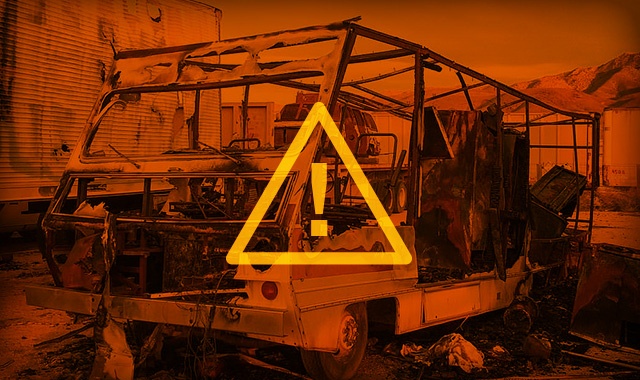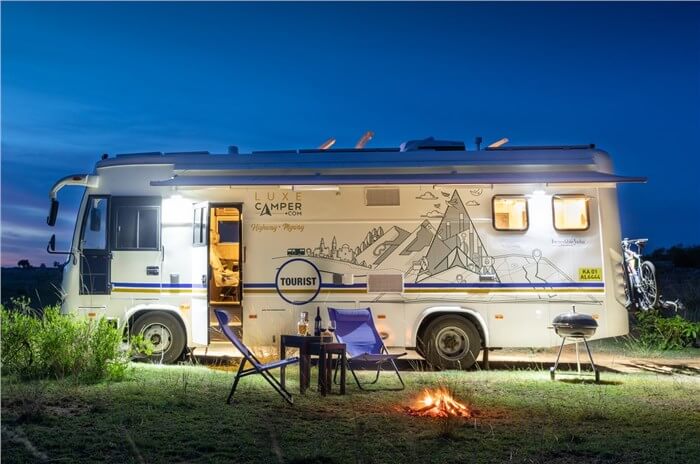Out to explore the world? Or up for a nomadic lifestyle? Or want to enjoy your retirement in peace? Well, whatever might be the reason you are thinking about living in a traveling caravan full time, you need to look over these few things before shifting.
There are multiple reasons why starting a full-time living in a recreational vehicle can be a heavy task. To start, are the laws? These laws won’t bother you unless and until you park your vehicle in your backyard or use it for camping. But you fall in the bracket when you declare your traveling caravan as a new home.
The thing with living full-time in a recreational vehicle is that it may pose a danger to your neighbors’ privacy. The other issue that comes in is the issue regarding a permanent address. A traveling caravan cannot be assigned a permanent address. This causes problems in legal documents and other federal processes. In some other places, parking of a recreational vehicle is allowed for a limited period. Hence, looking out for the rules and regulations of where you are looking to live full-time in your mobile home is essential.
Here we bring you a list of all the little things you need to pay attention to. Starting with:
Things to Keep in Mind While Buying the Land

Local Rules and Regulations
First things first. Before even planning on buying land to park your RV on, look over the laws of the country, the state, and the city where you plan to park your traveling vehicle. Different regions have different rules. While some cities might allow an RV-centric mode of living, some towns might feel parked RVs are a terrible thing on the map of their towns.
Both are correct on their side. Imagine landing at New York airport and you find parked caravans instead of sky-touching skyscrapers. What would be your first impression? Hence, looking out for land in villages or “developing cities” is always preferable to live in your RV permanently. The rules here are flexible, giving you the freedom and the peace for which you opted this lifestyle.
Neighborhood Concerns
First things first. Before even planning on buying land to park your RV on, look over the laws of the country, the state, and the city where you plan to park your traveling vehicle. Different regions have different rules. While some cities might allow an RV-centric mode of living, some towns might feel parked RVs are a terrible thing on the map of their cities.
Both are correct on their side. Imagine landing at New York airport and you find parked caravans instead of sky-touching skyscrapers. What would be your first impression? Hence, looking out for land in villages or “developing cities” is always preferable to live in your RV permanently.
The rules here are flexible, giving you the freedom and the peace for which you opted this lifestyle.
Permanent Residence
The next thing you need to tick off the list if you want to live legally in your Recreational Vehicle is to claim permanent residence. You don’t need a permit if you are parking your RV on the property. The problem starts when you declare it as your permanent residence. This is for the administration and other federal reasons.
Luckily, Internal Revenue Services, the body in charge of this, recognizes a home as providing these basic amenities to the resident. The services are cooking, sleeping and toilet. Once the application is sent, an inspector of your area is appointed for checking. The inspector examines your RV and lets you know if there are any shortcomings.
You can be eligible for a fine if the changes are not fulfilled in the stipulated time frame. These basic amenities include quite a few things, which will be discussed in the upcoming sections of the blog.
As mentioned above, the basic amenities include various things in the bracket. It mainly contains rules regarding building and safety, proper sewage, and electrical systems. These are not complicated, just some basic rules that ensure no risk to you or society.
Basic Must-Meet Requirements
They are starting with the building codes. These are some basic regulations one needs to follow while building or calling their residence to qualify as “home.” These are commonly known as International Building Codes. Of course, there are many, but here we mention some basic and standard codes to add to your knowledge.
First, your residence should have a minimum of two exits. Second, if any electrical wires are to be used, they should be installed using underground or overhead measures. Third, there should be a heating and cooling system in place.
Fourth, it should be something that keeps you warm and should be free of mold. These codes seem pretty basic, but they are something designed while keeping in mind factors like the protection of public health, safety, and welfare. There are other rules for complex structures to which one can refer.
Fire Safety

Other categories of welfare-based rules one needs to keep in mind, not just for checking but also for personal safety, are equipment regarding fire emergencies. One should have a proper fire safety system installed in their traveling caravans. Fire alarms, fire extinguishers, and smoke detectors are some of the essential fire safety equipment one must have.
Sewage Issues
The next thing is sewage. Different regions have different rules regarding sewage. For developed and promising cities, one must have a septic tank installed. If not, they have two options: get access to the city sewage system. The other option is to establish a septic tank, for which one again needs permission.
Due to these reasons, getting land in a village or the countryside is preferred. In these regions, one can work with black tanks if they have permission to dump them. If not, one can also work with composting toilets.
Composting includes gathering the human waste and then processing this human waste in a pit dug enough to prevent the flies. When given the right environment, such as water or worms, in some cases, this waste gets converted into natural manure. This can be reused again to provide healthy crops or garden manure. Hence, it doesn’t offer a way to get rid of waste but also a way to reuse it!
Whatever the case, one must refrain from dumping waste in the open. Instead, one should leave or compost this waste for the collective good to prevent disease carriers from getting active.
Electricity Rules
The following important factor is electricity. An RV requires electricity for a wide range of purposes- whether it be using the heating and cooling systems or TVs or the lights, all need electricity to function.
The rules to follow regarding electric connections if you are looking forward to having a permanent residence are: Long-term usage of a 110-120 volt extension line from a residence to your RV is impossible.
It must instead pass through a conduit, ideally underground, before entering a utility box in your RV. The sort of cable and connectors that link the utility box to your RV is then specified by codes.
Following electric safety measures is not important just so that the visiting officer doesn’t fine you. But also to keep yourself safe.
A tiny spark or a short circuit can prove to be very dangerous. Hence, one should always keep their electrical connections up to the mark.
Per-Person Space Occupancy

Just when you thought there might not be something else you don’t need to worry about, a new thing just got added to the list. This is space occupancy. If you plan to live alone in their Recreational Vehicle, you can happily skip this section.
But for those going on a sharing basis, there are rules in the book that specify a minimum each member at the residence must have to prevent themselves from getting themselves on the radar. Again, if you are living with your family, there are some exemptions. But if you share with someone unrelated to you, following the rules is the best option.
In a nutshell, one is more than welcome to travel and explore the world in a traveling caravan. But if you decide to make your RV your home, whatever the reason, there is an extensive list of things and rules you need to follow. The place you choose to buy the land, its rules and regulations, and the neighborhood are some factors that decide your experience as a full-time RV resident.
Keeping these different rules and regulations, parking your RV in a developing area, the countryside or a village is the best option. While it provides flexibility regarding rules, it also offers an easy solution in some cases, such as sewage-related ones. The peaceful life, a good neighborhood, and scenery are add-ons. The low cost of various day-to-day requirements adds to the minimalist lifestyle of the RV resident. Keep your RV up to date to prevent trouble from the inspecting officers, and you are all set to enjoy your new phase of life.

